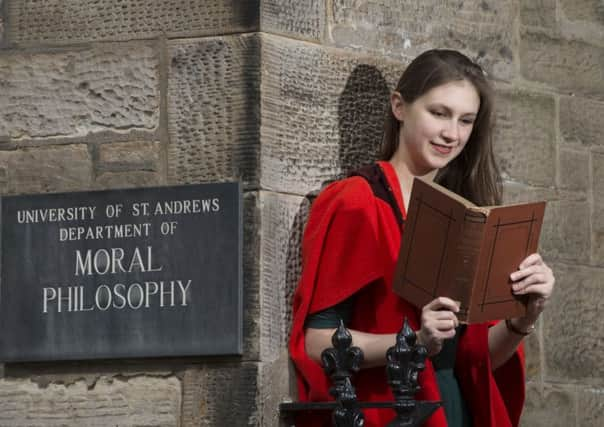Columnist: St Andrews belongs to everyone - and us


About 10 seconds later tea sprayed forth when I read the front page headline: “St Andrews University - English students edging out Scots.”
It transpires free education in Scotland comes with a price, namely this: If St Andrews accepts more than a government-specified quota of Scottish students then the university “expects” to be heavily fined.
Advertisement
Hide AdAdvertisement
Hide AdAs a result, English students (of which there are many) who apply are being accepted with poorer grades while Scots with straight A’s are being knocked back.


A couple of years ago, I had been sniffing around the admission statistics because I suspected Scots could be losing out at St Andrews, given its post-Prince William popularity.
Sure enough, the university revealed ten applicants were competing for every available space but, nevertheless it appeared Scots were still attending in relatively healthy numbers.
If the Times piece is bang to rights, however, it marks a worrying development.
You see, the problem is not entirely new.
Advertisement
Hide AdAdvertisement
Hide Ad

Back in the ‘60s a natural history curator asked my mum (who worked in the labs): “Why do local students not want to come here? This is their university.”
But it was never just ‘ours’. In the ‘90’s when I was an undergraduate, the student population was divided roughly into 40 per cent Scots, 40 per cent English and 20 per cent international which meant a Fife pupil only had to travel a few miles to experience the world.
While American students (who paid huge tuition fees) seemed oblivious to the nuances of British class division, the rest of us danced around and built friendships across public/state school backgrounds and north/south territories.
But sometimes the differences were insurmountable. In art history, for example, some students simply learned the art of good dinner conversation and found a husband (a difficult task given the Lloyds crash).
Advertisement
Hide AdAdvertisement
Hide AdOthers revealed housemasters had written ‘letters of introduction’ as a way to oil the admission process – a revelation which had us Scots thinking: “Why? You either had the grades or not.”
But St Andrews offered Scots a unique opportunity, especially those from a working-class and state-school background like me, that we could survive and thrive in such a melee.
Not only were we the intellectual equivalents of someone from Eton, we learned something much more important from them - chutzpah.
Social mobility was arguably greatest in the ‘60s thanks to the power of education yet, today, disadvantaged Scots are four times less likely to go to a university, let alone St Andrews, than those from the wealthiest backgrounds.
While St Andrews pursues an international reputation it should aim to protect its heritage, I say. Meanwhile, the Scottish Government must get a grip because this situation is shameful.